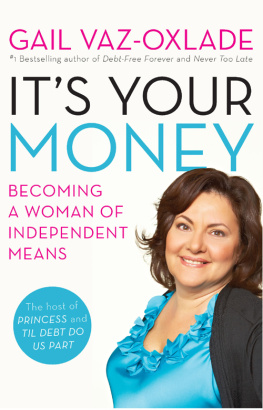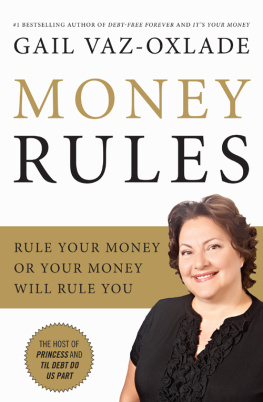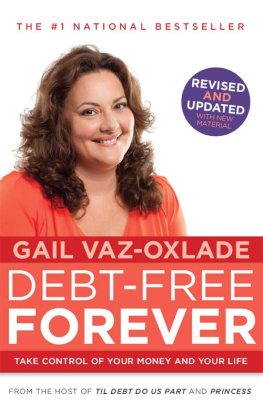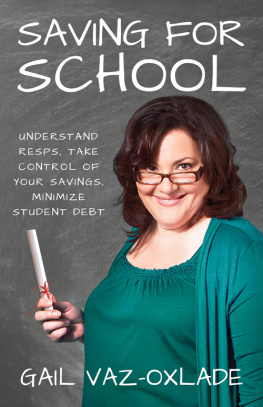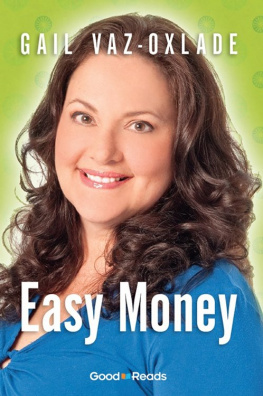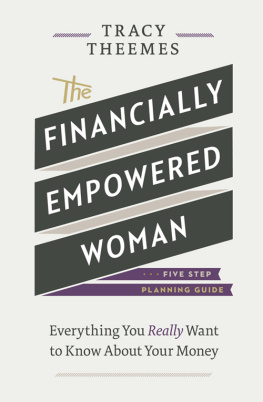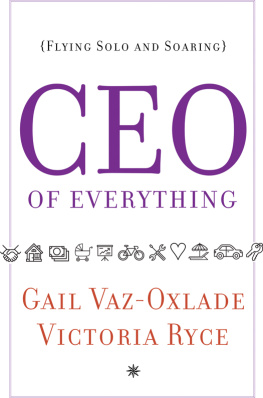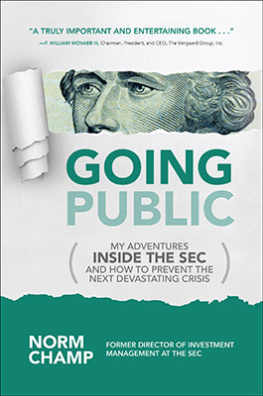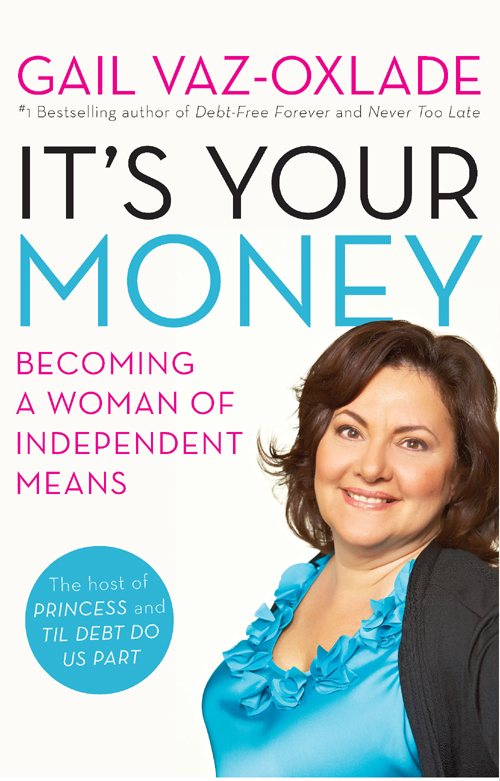To my children, Alexandra and Malcolm. You helped me to
become who I am today. Your love is my air.
To all the women who demanded that I republish this book.
Thanks for the push.
And to Kate, who saw the potential.
W hen I set out to write this book, one of my objectives was to help women put money in perspective. It seems money has become far more important than it should be. Our drive to amass wealth, the fear we feel when we think that we may not have enough, and the sleepless nights we endure as we wonder if the cheque will clear or bounce to the stratosphere are all unhealthy.
In 1997, USA Today published a graph that showed what people worry about when it comes to their money. Seventy percent of women feared not having enough money when they were old. According to the Statistics Canada publication Growing Old in Canada, an alarming 40% of women over the age of 75 who were living on their own had incomes below the poverty line. And since a woman 75 or older has a greater chance of being disabled than her male counterpart, this can paint a grey picture for our futures. But we can paint this picture with fresher, more vibrant colours. We have the ability to do what we must to take charge of our present and our future. But to do it, we have to understand how money works. And we have to be willing to take charge of our own financial lives.
Many women still believe that dealing with finances is a mans job. Time and again I speak with women who have given financial control completely to their husbands, fathers, or sons. I continue to be astounded. You might think that this is a characteristic of older womenwomen who havent been educated in the finer points of feminism. Youd be dead wrong. Whos in a better position to have a handle on personal finances than an accountant or a financial planner? How about an accountant who is a financial planner? I have a story that clearly demonstrates how knowing and doing are two distinctly different things.
Marla had been married for several years when she and her husband separated. At that point, Marla was forced to take a long, hard look at her money situation. She was surprised to discover that despite the fact that both she and her husband had been saving and investing aggressively, their investment portfolio had not done much in the past few years. Marla had left all the investing up to her husband. He chose investments that performed badly and, in the end, Marla paid for it. After putting away a significant portion of her income each year, she had far less to show for it than she should have had.
What would motivate a well-educated, professional money manager to leave the decision-making to someone else? If money is so important in terms of keeping a roof over our heads and food in our childrens tummies, then why are so many of us still willing to let our partners do the dirty work"? The answer may be the same thing that motivated you to take this track. First, if money creates a conflict, and you want to avoid conflict, you choose the route of least resistance and let him do it all. If you have different investment strategiesand youve been convinced that doing it your way will take too longyou let him have his way. If you trust him implicitly, you let him make the decisions and live with the consequences, good or bad. No one is always right, after all. If you dont have the time, dont have the energy, or dont have the desire to do it for yourself, its easy to give the responsibility to someone else.
We still have a long way to go in coming to terms with money and the role it plays in our lives. Money issues seem to pull us from one extreme to another: from complete denial to obsessive concern. Somewhere there is a middle groundone that will be infinitely easier to walkwhere we can put money into its correct context and deal with it in a logical, rational, and decent manner.
Most financial discussions fail to help people understand how they feel about money. While they may demonstrate how to budget, stress the importance of saving, and describe the various investments available, they seem incapable of motivating people to put into practice what many already know. What little has been written on the psychology of money often doesnt integrate the practical information. And despite the proliferation of books on all aspects of personal finance, the ability to convert that knowledge into practical, day-to-day good money management is elusive.
LIFE CYCLE FINANCIAL PLANNING
Part of how I want you to look at money differently is by thinking about your money in terms of where you are in your life. Different stages mean different needs. As your needs change, you must change what youre doing with your money.
Life cycle issues have been used for years to help manufacturers and retailers decide how to target their customers. If youre a single woman without children, you likely read different magazines, eat different foods, and wear different clothes than the woman who is mired in rug rats. When I was single, I ate out more often, I wore high-heeled shoes, and I hardly ever thought about spot removers for my carpet, my couch, or my clothes.
Just as where we are in our life cycle influences the goods we buy, so too must it be considered when were thinking about which financial products we should use. As Ive moved through my life cycle, Ive gone from shopping for guaranteed investment certificates to shopping for mutual funds to buying the index. Ive had to think about divorce, stepchildren, and satisfying financial commitments to ex-spouses. And Ive been forced to face my own mortality and make a will.
Perhaps the one change in my life that most affected me was the birth of my children. I had no idea that having children would be this all-consuming, over-the-top, fantabulous experience. Ive found in talking with women that Im not the only one completely blown away by the experience. In fact, one of the questions Im most often asked is, How can I stay home with my baby and still help make ends meet? This is just one example of how a change in life cycle can throw a spanner in the works of the best-laid plans.
Life cycle issues have become increasingly more complicated as our norms have changed. The traditional life sequenceschool, job, marriage, child rearing, empty nesting, widowhoodhas become jumbled. Many women complete their degrees well after the traditional school age. Many delay having children until their careers are well-established. And divorce has changed the family structure so that many women now must raise children on their own, or help raise stepchildren, without ever having considered what parenthood would hold for them. Just thinking about the various forms a family can take is enough to boggle the mind. And just as there are new structures within which we must live, so too are there new financial issues with which we must come to terms.
Since there is no such thing as a normal life cycle anymore, does that mean we have to throw out the concept of life cycle financial planning? I dont believe it does. After all, whether you are having your first child at 20 or 40, the issue of educational savings becomes important. And whether you are widowed at 55 or divorced at 30, you better have your own credit history established if you want to be able to function within the financial world.

